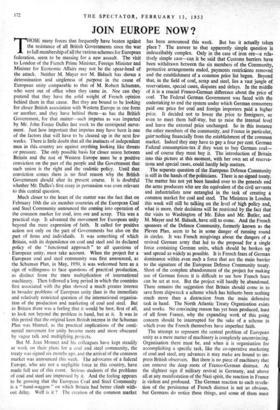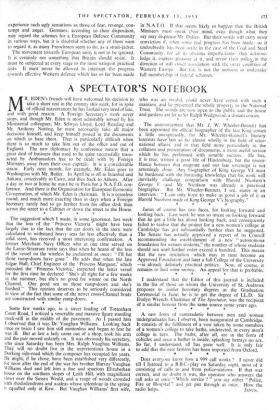JOIN EUROPE NOW ?
THOSE many forces that frequently have beaten against the resistance of all British Governments since the war to full membership of all the various schemes for European federation, seem to be massing for a new assault. The visit to London of the French Prime Minister, Foreign Minister and Minister for Economic Affairs may not be the spear-head of the attack. Neither M. Mayer nor M. Bidault has shown a determination and singleness of purpose in the cause of European unity comparable to that of M. Robert Schuman, who went out of office when they came in. Nor can they pretend that they have the solid weight of French opinion behind them in that cause. But they are bound to be looking for closer British association with Western Europe in one form or another, and they have behind them—as has the British Government, for that matter—such impetus as was imparted by Mr. John Foster Dulles last week to the centripetal move- ment. Just how important that impetus may have been is one of the factors that will have to be cleared up in the next few weeks. There is little doubt that all the instincts of independent men in this. country are against anything looking like threats or pressure. The only possible basis for closer union between Britain and the rest of Western Europe must be 'a positive conviction on the part of the people and the Government that such union is the right and the realistic policy. Until, that _ conviction comes there is no final reason why the. British Government should alter its present course. It is doubtful whether Mr. Dulles's first essay in persuasion was even relevant to this central question.
Much closer to the heart of the matter was the fact that on February 10th the six member countries of the European Coal and Steel Community announced the coming into operation of the common market for coal, iron ore and scrap. This was a practical step. It advanced the movement for European unity beyond the mere expression of faith. It -called for positive action not only on the part of Governments but also on the part of firms and individuals. It was something of which Britain, with its dependence on coal and steel and its declared policy of the " functional approach " to all questions of European unity, must take account. When the project for a European coal and steel community was first announced, as the Schuman Plan, in May, 1950, it was welcomed here as a sign of willingness to face questions of practical production, as distinct from the mere multiplication of international machinery. Then followed a long period in which the countries first associated with the plan showed a much greater interest in broader problems of European unity than in the immediate and relatively restricted question of the international organisa- tion of the production and marketing of coal and steel. But in Britain there was a feeling that it would be best, first of all, to look not beyond the problem in hand, but at it. It was in this period that the original keen British interest in the Schuman Plan was blunted, as the practical implications of the conti- nental movement for unity became more and more obscured by vague talk and multiplyingprojects.
But M. Jean Monnet and his colleagues have kept steadily at work on their plans for a coal and .steel community, the treaty was signed six months ago, and the arrival of the common market was announced this week. The advocates of a federal Europe, who are not a negligible force in this country, have made full use of this event. Serious students of the problems of coal and steel are impressed by it. And the feeling appears to be growing that the European Coal and Steel Community is a " band-waggon " on which Britain had better climb with- out delay. Well is it ? The creation of the common market has been announced this week. But has it actually taken place ? The answer to that apparently simple question is indescribably complex. Only in the case of iron ore—a rela- tively simple case—can it be said that Customs,barriers have been withdrawn between the six members of the Community, protective arrangements ended, payments restrictions removed and the establishment of a common price list begun. Beyond that, in the field of coal, scrap and steel, lies a vast jungle of reservations, special cases, disputes and delays. In the middle of it is a crucial Franco-German difference about the price of coal. The Federal German Government was faced with the undertaking to end the system under which German consumers paid one price for coal and foreign importers paid a higher price. It decided not to lower the price to foreigners, or even to meet them half-Way, but to raise the internal level and leave the external price unchanged. So in this instance the other members of the community, and France in particular, gairr nothing financially from the establishment of the common market. Indeed they may have to pay a four per cent. German Federal _consumption-tax if they want to buy German coal— and of course they must buy it. The introduction of Britain into this picture at this moment, with her own set of reserva- tions and special cases, could hardly help matters.
The separate question of the European Defence Community is still in the hands of the politicians. There is no signed treaty. The matter has not yet been handed over to the generals and the arms producers who are the equivalent of the civil servants and industrialists now entangled in the task of creating a common market for coal and steel. The Ministers in London this week will still be talking on the level of high policy and, what is more, their decisions will be restricted by the fact that the visits to Washington of Mr. Eden and Mr. Butler, and M. Mayer and M. Bidault, have still to come. And the French sponsors of the Defence Community, formerly known as the Pleven Plan, seem to be in some danger of running round in circles. It was French misgivings about the dangers of a revived German army that led to the proposal for a single force containing German units, which should be broken up -and spread as-widely as possible. It is French fears of German dominance within even such a force that are the main barrier to the signature of the European Defence Community treaty. Short of the complete abandonment of the project for making use of German forces it is difficult to see how French fears can be set at rest. But the project will hardly be abandoned. There remains the suggestion that Britain should come in to save from shipwreck a scheme which has hitherto been nothing much more than a distraction from the main defensive task in hand. The North Atlantic Treaty Organisation exists and works. No convincing reason has yet been produced, least of all from France, why the expanding work of this going concern should be interrupted for the sake of a scheme in which even the French .themselves have imperfect faith.
The attempt to represent the central problem of European unity as a mere matter of machinery is completely unconvincing. Organisation there must be, and when it is organisation for accomplishing a specific task, like the co-operative marketing of coal and steel, any advances it may make are bound to im- press British observers. But there is no piece of machinery that can remove the deep roots of Franco-German distrust. At the slightest sign if military revival in Germany, and above all at any manifestation of the Nazi spirit, the reaction in France is violent and profound. The German reaction to each revela- tion of the persistence of French distrust is not so obvious, but Germans do notice these things, and some of them must experience such ugly sensations as those of fear, revenge, con- tempt and anger. Germans, according to-their disposition, may regard the schemes for. a European Defence Community in various ways, but it is doubtful whether any of them want to regard it, as many Frenchmen seem to do, as a strait-jacket.
The movement towards European unity it not to be ignored. It is -certainly not something that Britain should resist. It must be subjected at every stage to the most stringent practical tests. It must never be allowed to interrupt the progress towards effective Wegtern defence which has so far been made in N.A.T.O. If that seems likely to happen then the British Ministers must speak their mind, evea though what they say may displease Mr Dulles. But their words will carry more conviction if. when some real progress has been made—as it undoubtedly has been made in the case of the Coal and Steel Community. for all its obvious imperfections--they acknow- ledge it, express pleasure at it, and revise their policy,,in the -direction of still closer association with the other countries of Western Europe. But this is not the moment to undertake full membership of federal schemes.



































 Previous page
Previous page